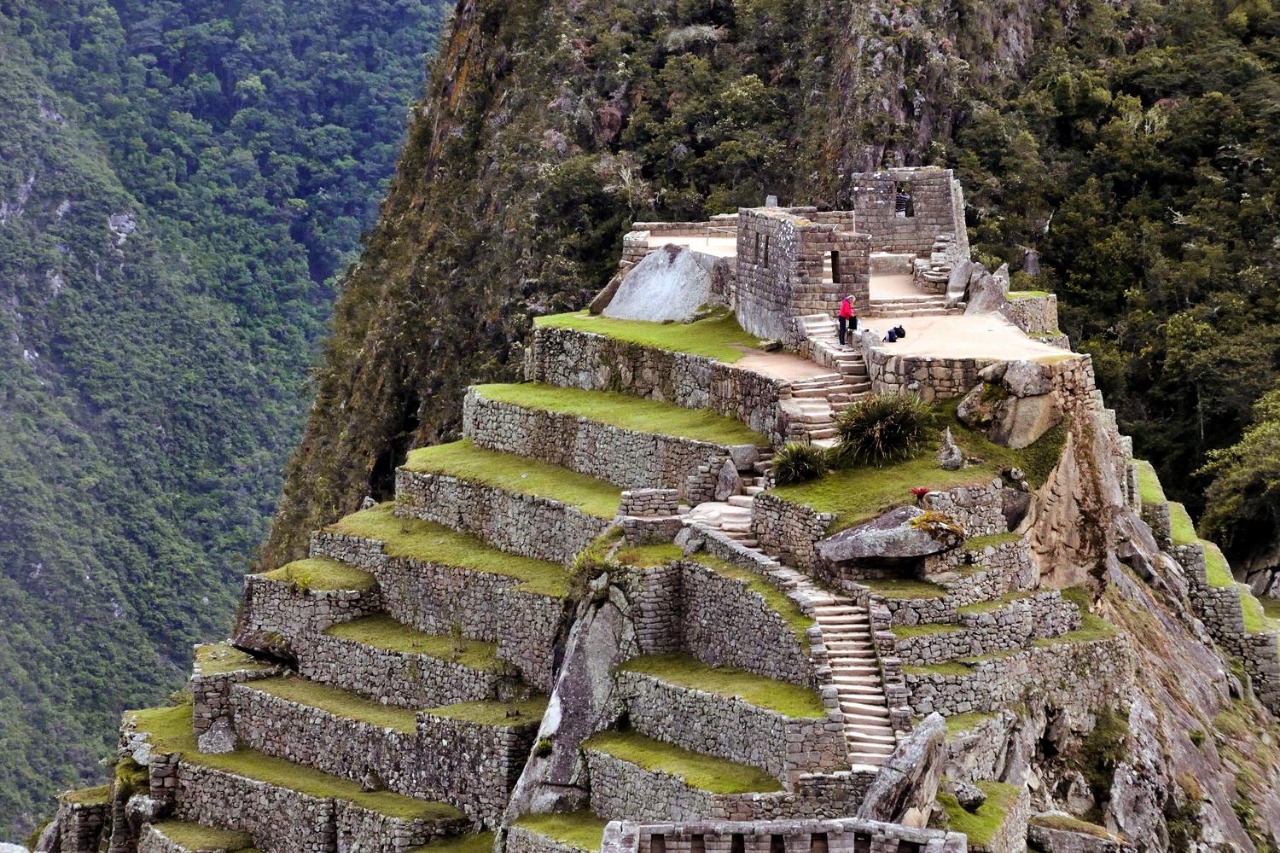Pictures of: Machu Picchu, Peru
Location map
Airports
Hotels and other Accommodation
What to visit
Where to Eat
World Nomads
The Travel Insurance with the largest coverage

The Travel Insurance with the largest coverage

Machu Picchu
Machu Picchu (in Quechua Machu Pikchu, "old mountain"), also called "lost city of the Incas", is a well preserved pre-Columbian city, located at the top of a mountain, at 2,400 meters of altitude, in the valley of the river Urubamba , current Peru. It was built in the 15th century, under the orders of Pachacuti. The site is probably the most typical symbol of the Inca Empire either because of its original location and geological features or due to its late discovery in 1911. Only about 30% of the city is of original construction, the rest was built. The reconstructed areas are easily recognized by the fit between the stones. The original construction is made up of larger stones, and with grooves with little space between the rocks.
It consists of two large areas: the agricultural area consisting mainly of terraces and food storage enclosures; and the other urban one, in which the sacred zone with real temples, squares and mausoleums stands out.
The layout of the buildings, the excellence of the work and the large number of terraces for agriculture are impressive, highlighting the great capacity of that society. In the middle of the mountains, temples, houses and cemeteries are distributed in an organized way, opening streets and taking advantage of the space with staircases. According to Inca history, everything planned for the passage of the sun god.
The place has been elevated to the category of UNESCO World Heritage, having been subject of worries due to the iteration with the tourism for being one of the most visited historical points of Peru.
There are several theories about the function of Machu Picchu, and the most accepted is that it was a settlement built with the purpose of supervising the economy of the conquered regions and with the secret purpose of taking refuge in the case of the Inca sovereign and his nearest entourage .
Machu Picchu is a UNESCO World Heritage site.
Machu Picchu is a UNESCO World Heritage site.
It consists of two large areas: the agricultural area consisting mainly of terraces and food storage enclosures; and the other urban one, in which the sacred zone with real temples, squares and mausoleums stands out.
The layout of the buildings, the excellence of the work and the large number of terraces for agriculture are impressive, highlighting the great capacity of that society. In the middle of the mountains, temples, houses and cemeteries are distributed in an organized way, opening streets and taking advantage of the space with staircases. According to Inca history, everything planned for the passage of the sun god.
The place has been elevated to the category of UNESCO World Heritage, having been subject of worries due to the iteration with the tourism for being one of the most visited historical points of Peru.
There are several theories about the function of Machu Picchu, and the most accepted is that it was a settlement built with the purpose of supervising the economy of the conquered regions and with the secret purpose of taking refuge in the case of the Inca sovereign and his nearest entourage .
Machu Picchu is a UNESCO World Heritage site.
Machu Picchu is a UNESCO World Heritage site.
Tourism
Machu Picchu is simply the number one attraction of Peru and perhaps of the Andean America itself. Since the scientific discovery of the Inca citadel was announced by the American historian Hiram Bingham in 1911, its complex and mysterious architecture embedded in a dramatic mountain scenery has attracted tourists from all over the world.
So much popularity has taken Machu Picchu, one of the new seven wonders of the world, to suffer from unbridled tourism and some of the country's highest prices. Even so, hordes of tourists disembark endlessly in this ancient Inca city of stone, either by the classic Inca Trail or by trains coming from Cusco. And there are many reasons for such determination. Machu Picchu, which in Quechua language means "old mountain", is located on a granite mountain and houses impressive buildings erected with heavy blocks of rock. Surrounded by puzzles regarding its creation and service, the site, declared by Unesco as Cultural and Natural Heritage of Humanity, is 112 kilometers from Cusco and 2,350 meters above sea level.
For many, it is the journey of a lifetime.
Attention: due to the rapid degradation of the site, the Peruvian government has been limiting the number of visitors to the site. For those who travel with agencies, they will make the reservation for admission to the ruins, but the independents must do so in advance with the authorities.
So much popularity has taken Machu Picchu, one of the new seven wonders of the world, to suffer from unbridled tourism and some of the country's highest prices. Even so, hordes of tourists disembark endlessly in this ancient Inca city of stone, either by the classic Inca Trail or by trains coming from Cusco. And there are many reasons for such determination. Machu Picchu, which in Quechua language means "old mountain", is located on a granite mountain and houses impressive buildings erected with heavy blocks of rock. Surrounded by puzzles regarding its creation and service, the site, declared by Unesco as Cultural and Natural Heritage of Humanity, is 112 kilometers from Cusco and 2,350 meters above sea level.
For many, it is the journey of a lifetime.
Attention: due to the rapid degradation of the site, the Peruvian government has been limiting the number of visitors to the site. For those who travel with agencies, they will make the reservation for admission to the ruins, but the independents must do so in advance with the authorities.
Gastronomy
The typical Peruvian table reserves delicacies appreciated by many palates.
We can find among them the famous Ceviche (raw fish or shrimp marinated with lemon juice), Corn Soup, "A la Criolla" Soup (with meat, milk, onion, garlic, pepper, bread and oregano), Rocoto (spicy pepper stuffed), the Alpaca on the Grill (from the Ilhamas family), the Cuy ao Forno (from the rabbit family), the Kapche Cheese, the Tamal, the Humita, the Chicharrón con Mote and the list seems to have no end. ..
If it is to drink, we drink the national drink that is Pisco Azedo, a kind of liquor made with grape, lemon, egg white and cinnamon.
And for those who can not or do not like alcohol there are options of Chicha Morada made with purple corn and the local soft drink that competes with the international brand and is called Inka Cola.
If you like a good cold beer in any part of the world, you will be happy to know that cheap beers here are of high quality, among the well-known brands are Cusqueña, Cristal and Arequipeña.
For dessert to sweeten the trip, you will have the option of the tasty Sigh of Limeña, the Manjar Blanco or the well-known Cake with Ice Cream.
If you are a fruit fan, you will delight the palate with Chirimoya (a kind of creamy apple), Lúcuma (similar to walnut) and that it fits very well with an ice cream and we still have Tuna (the fleshy part of a type of cactus).
We can find among them the famous Ceviche (raw fish or shrimp marinated with lemon juice), Corn Soup, "A la Criolla" Soup (with meat, milk, onion, garlic, pepper, bread and oregano), Rocoto (spicy pepper stuffed), the Alpaca on the Grill (from the Ilhamas family), the Cuy ao Forno (from the rabbit family), the Kapche Cheese, the Tamal, the Humita, the Chicharrón con Mote and the list seems to have no end. ..
If it is to drink, we drink the national drink that is Pisco Azedo, a kind of liquor made with grape, lemon, egg white and cinnamon.
And for those who can not or do not like alcohol there are options of Chicha Morada made with purple corn and the local soft drink that competes with the international brand and is called Inka Cola.
If you like a good cold beer in any part of the world, you will be happy to know that cheap beers here are of high quality, among the well-known brands are Cusqueña, Cristal and Arequipeña.
For dessert to sweeten the trip, you will have the option of the tasty Sigh of Limeña, the Manjar Blanco or the well-known Cake with Ice Cream.
If you are a fruit fan, you will delight the palate with Chirimoya (a kind of creamy apple), Lúcuma (similar to walnut) and that it fits very well with an ice cream and we still have Tuna (the fleshy part of a type of cactus).
Weather
Its climate is similar to that of the ancient capital of the Inca empire, yet being about 1000 meters below the altitude of Cusco, its climate is milder with temperatures closer to those found in Lima than in Cusco.
The division of the seasons follows the same pattern with only two well-defined seasons, that of the droughts of May to October and of the rains between November and April.
The division of the seasons follows the same pattern with only two well-defined seasons, that of the droughts of May to October and of the rains between November and April.
Other tourist destinations in:
Peru
Peru
Other world tourist destinations
Why to book with ROTAS TURISTICAS
The best prices
Our partnerships with the world´s largest operators offer research on the best market prices.
More options
At Rotas Turisticos you can book the hotel, buy the air ticket, book the transfer from the airport to the hotel and vice versa, book the local excursions, rent the car, take travel insurance and consult the places to visit and where to go.
Holiday Tips & Destinations
Hundreds of holiday destinations with all the options that allow you to easily choose the destination that best suits your dream vacation.
ROTAS TURISTICAS
Links









